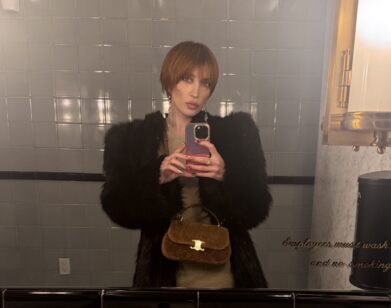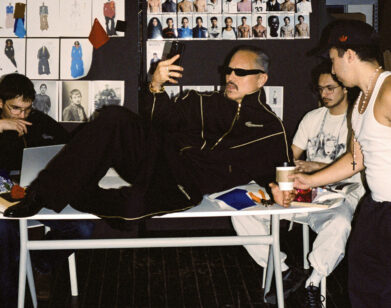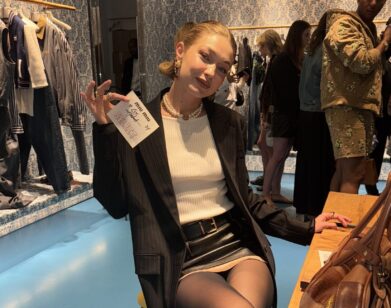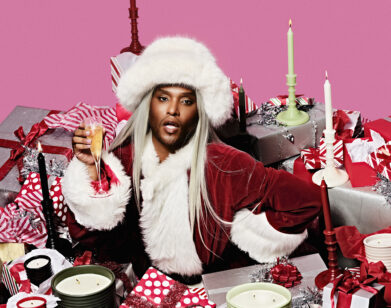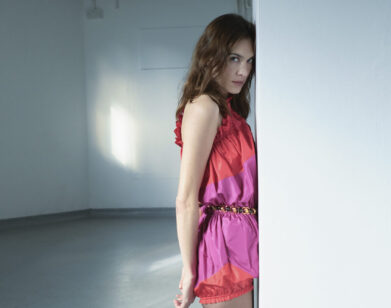Jean Touitou
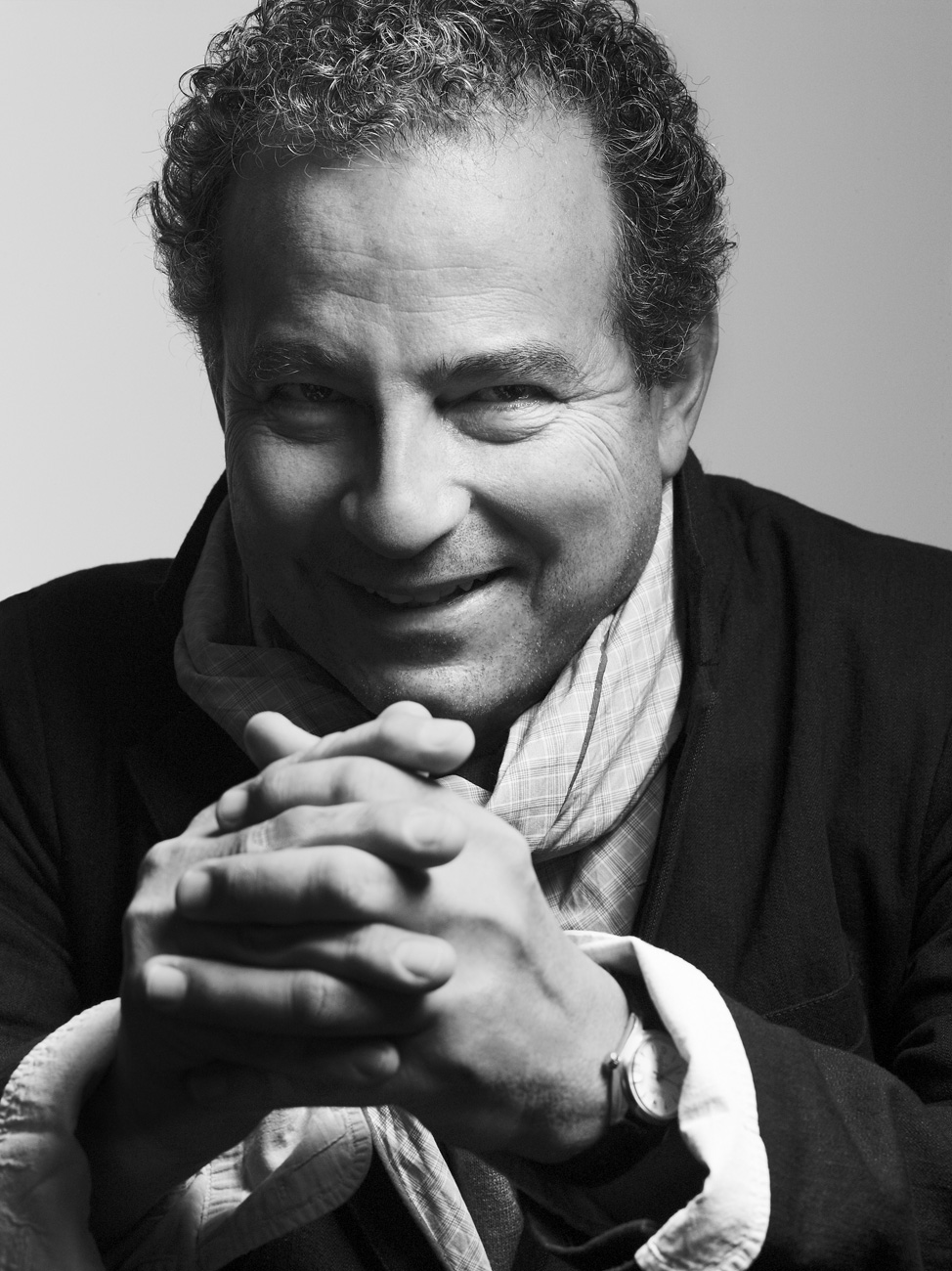
When thinking of understated, minimal men’s and women’s clothing with that hard-to-define effortless something, the name Atelier de Production et de Création, or A.P.C., is one that immediately springs to mind. Jean Touitou started the label in 1987 as a reaction to what he saw as the loud, money-focused, gaudy mood of the ’80s. An idealist and revolutionary who had fallen somehow unexpectedly into fashion in the late ’70s, Touitou, born in Tunisia and raised in Paris, was looking for a movement and couldn’t find one, so he decided to create an alternative to what he saw around him. Relying more upon his gut instincts and amalgamating his genuine interests (such as music) and friends into the mix rather than following a more traditional business approach, Jean Touitou’s A.P.C. has established a somewhat timeless chic that has continued to resonate some 23 years, now with a whole new generation appreciating the brand and new stores opening in New York and Paris this year.
FRASER COOKE: So, hi Jean. Let’s go all the way back to the beginning. How did you find yourself in this business, and what was going on in your life preceding that?
JEAN TOUITOU: I became involved strictly by accident. I just wanted to join a group of people doing things differently from what I could see around me in Paris back then. So by chance I bump into some people who were working at Kenzo, and that was in ’77 or ’78. There was a very raw unsophisticated energy there in those days and whatever those people would have done, I would have joined them. It was that simple.
COOKE: So what was it that was so different about this crew that drew you to them at the time?
TOUITOU: Well, let’s say I was a bit disappointed because revolution didn’t happen, like from ’68 to ’76, and I was more than annoyed by that. I finished my studies and had wanted to be a history teacher, because I didn’t want to be involved with money. I had this complex of all my friends being sons of professors or architects and my father was a merchant. I thought working for money was somehow filthy or something.
COOKE: Not so noble?
TOUITOU: Yeah, all of my friends’ parents were publishers, lawyers, teachers, and it seemed a cleaner path to be a teacher somehow. But that wasn’t an option either because you had to take the train at six in the morning going far into the suburbs, which I didn’t fancy . . . So instead I went around South America in a car for one year and then I got back toParis . . . And I wasn’t so crazy back then, taking drugs or anything like some were, but all I knew was that I just didn’t want to be around boring people. And this bunch were acting crazy but still doing a legitimate business around this Japanese fellow named Kenzo, and I wanted to join that crew whether they were doing yogurt or architecture or shoes. The vibe was attractive. And I said, “Let me do anything you want. I’ll do it.”
COOKE: How old were you then?
TOUITOU: Maybe 26 or something. Grown-up enough as a young man could be. Basically a man at 26 is like a woman at 16 . . . An adolescent. [laughs] And I discovered this mix of business and creativity that is fashion, and Kenzo was my school. I did everything from packing boxes to accounting.
COOKE: I guess that helped round out your skills to set you up on your own eventually?
TOUITOU: Yeah, I got really friendly with the boss, Kenzo’s partner, and in the end he helped me leave and start a record label called Roadrunner Records . . . [laughs] which released some original material and was also a mail-order auction business specializing in ’60s American garage punk. I had to travel a lot around the States picking up various stuff, but eventually after two years [the label] was bankrupt. And so I went back to Kenzo, becoming an accountant for them, which was totally new to me, but it helped me learn the whole picture.
COOKE: So that explains the music that was always there then? It’s a hard business, right?!
TOUITOU: Yeah, very tough. So I was back to where I started, and I actually ran into a friend who was married to Agnès B. and helped them start the Prince Street store, which not so many people know. Then eventually in ’87 I started A.P.C. as a combined store and office on Rue Princesse near to where the very good bookstore Village Voice is now. It wasn’t easy in the beginning, so to finance this I had to be a ghost designer for some brands with no recognition for myself for being involved. I did a lot for the brand Joseph of London, in particular, doing things like leggings, designing, and sourcing fabric and other commercial items, but with the profit I made from that, I used the cash to finance my own “unsellable stuff,” because it was so minimalist. But it was fun to be involved in those very different things at the same time.
COOKE: But I guess you had to segue out of that and eventually focus on A.P.C. full-time. How did that go down? Was it well-received initially?
TOUITOU: People received it pretty well, and it was initially only a men’s line, but women liked it more, which should have been the contrary. But it was ’87, so that look was happening then. Women dressed as men. And little by little I started to design things for women, maybe three seasons later. Now it has a little heavier focus on women’s. You have to be more focused with women’s. I mean, there are quite a few good designers out there, I believe, in men’s, but if you tell me I have competition, I’ll ask you who. Sorry, I know it sounds pretentious, but on an affordable, trendy, not-high-fashion, not-streetwear basis, I don’t see much out there that’s similar. Maybe I just don’t know and there is, but I don’t see the competition. In women’s, you always have to be ahead because there’s a lot of copying in this business, so you have to surprise them. Move quickly.
I’m sure my school will have some small impact on civilization that’s more positive than my days of being a militant.Jean Touitou
COOKE: But how do you stay in a place where you feel you have the direction right to keep ahead of the competition that you say is so fierce?
TOUITOU: I have some good intuition, I think, but I’ll tell you something: After being in this business around 23 years for A.P.C., you have to die and be born again. You have to say, “This store location isn’t happening,” and make it fresh somewhere else. You have to say, “This part of the team I’m working with now should maybe go somewhere else.” Or say to yourself, “Today maybe I don’t have the right ideas for part of today’s look, so maybe I need to get some help.” We have an excellent energy, with many positive young people in the studio, and that helps a lot.
COOKE: A while ago you said to me something about price and value and not making things too expensive while not making it seem so cheap that it has a low perceived worth, and earlier you also talked of that sense of discomfort with money just due to your longer-term values. Is that a very conscious way that you operate.
TOUITOU: Yeah, it’s a moral thing. It’s part of having some leftovers from my political past, and also because I won’t feel better once I’m dead with $100 million in my box—I know that. Some other people, believe me, they don’t know that, and they’re going straight to death being very rich. There’s this big mystery with the human soul, which I don’t control. Like take the size of a boat: I have a boat and it’s only 31 feet. To me, a boat of 100 feet is enormous. It should be the limit of a private boat’s size, maybe. But you have some dudes with 200-foot boats, and it’s unnecessary.
COOKE: Well, it’s an ego and status thing, clearly.
TOUITOU: It is a kind of “size-matters” syndrome, and if something should be changed, it’s this. I mean, being rich is fine, but there should be a limit to it. I just have my smallish Finnish coast guard boat that I happened to find out about from my shrink. But we’re not supposed to talk about those private things, so back to what we were talking about . . . I didn’t mean to stray onto boats. For many in this business, if they can make something and multiply it by nine, it’s like having a shot of heroin in the arm, a kick. I don’t have a kick from that. I get off on running the company, making a decent profit, paying people fairly, and having more than a decent life for myself—but that’s it.
COOKE: Well, I definitely had the impression observationally from knowing you a little and even from your blog, that you have a really balanced life—work, family, leisure, etcetera . . .
TOUITOU: A lot of people I know say that as if their own lives are really unbalanced, and so I don’t find too many people around me that live the same way as myself. I don’t have so many peers, apart from some totally young people, and I’m okay to be with those people who could be my children. I’m like the father figure sometimes, and I know that, but sometimes it’s nice to be something other than the boss or father.
COOKE: I often see you as an outsider, and what you do is quite different from what seems to be the general norm here in Paris, the heart of the fashion world. It seems maybe you consider yourself a rebel and maybe you enjoy that?
TOUITOU: It’s not really rebellious, because what I do isn’t so brave. I’m doing my own thing and I’m not at all in the celebrity culture. I mean, the two words don’t really make sense to me together. [laughs]
COOKE: I want to go back to the music, which is a theme, and you’ve released music before and after starting A.P.C. And now I see you’re selling some vintage amps.
TOUITOU: Oh, from the start, as soon as I had enough money to put a studio together, I did that. And I used to rent a lot of equipment, but now I gradually have bought what we needed. It’s been a bit slow in the last few years, where I had to focus on the clothing more than music because times were a bit shaky, but maybe later this year I’m going to start a new music project of cover versions. Johnny Cash probably . . .
COOKE: And I know that often when I see you, you tell me that younger people from Paris or elsewhere, as well as friends, use the studio.
TOUITOU: Yes, a lot of my staff are in various bands and love music. So it’s handy and gives a good feeling to the company, letting them rehearse in the studio. I really like seeing musical equipment coming and going from the office. Those hard cases for touring are great to have around. I also get some mix CDs from my staff and I discover things and it reminds me of what I used to do years ago. For those kids, it’s their job to know what’s happening, so it’s great to have that exchange.
COOKE: With all the digital access, it’s hard to stay on top of everything, and a lot of things aren’t so new, really, ideas-wise.
TOUITOU: Yes, but still the same good tricks always work. We’re talking about pop culture and popular music and it only takes a good guitar riff and good organ riff and a bass line. The subject matter is timeless. That’s the great thing about pop culture. It’s always there for somebody to do a good piece. You can do a shitty piece, and a lot of it is, but it’s okay, and if you’re 17 it’s new anyway.
COOKE: Going back to the stores, you seem to be doing a lot again, opening new locations, especially in the U.S. recently.
TOUITOU: I’ve always had comments from people in the finance industry saying we should be bigger, but we do things in our own rhythm. So in the U.S. we opened L.A., expanded the mail-order, etcetera, but recently I really felt we needed to be in the West Village. I don’t know, but it seems to me that there are some corners of that part of town that are the most charming, yet raw, in the world.
COOKE: You do seem to have the knack for feeling the right time to be somewhere.
TOUITOU: Well, I don’t think that I’m an innovator to be in the West Village, but we will open two stores on Perry Street—one more jeans-and-accessories-focused and the other one will be the full collection. And in Paris I had the chance to open a spot on Rue Royale, which is totally a contrary area for what you’d expect me to do usually, as it’s a very commercial touristy street with only major fashion brands—my neighbors are Chanel and Dior. I’ll do my thing in my way, but I can say the idea for the store will be quite surprising, I believe. It’ll happen at the end of the year in December.
COOKE: And what about Asia in general? That’s all anyone has talked about for the past few years and you already have a big presence in Japan.
TOUITOU: Well, I never tried to conquer a place or market.
COOKE: No, I guess you seem to do things more on instinct or perhaps relationships. It strikes me that you wouldn’t open in a place where you wouldn’t want to spend time hanging out, too.
TOUITOU: That’s exactly true. I went to Shanghai four years ago. It was totally depressing, honestly, but if I met the right people, who knows? I don’t feel the pull like I do about the project on Perry Street. It’s totally in my body. I would love to go to India, but maybe what I do wouldn’t fit. I go where the wind takes me. The energy, the people you meet . . .
COOKE: So what are you working on and excited about right now? In general.
TOUITOU: Right now, two things. We started a huge project making patchwork quilts in the Amish tradition using leftover fabric from the brand’s 23 years, and that’s a lot to coordinate. We have one person in India who has studied Amish culture for 14 years. There’s been a tradition of quilt-making in my family because my mother used to make quilts with the old Kenzo fabrics. And I’m also working with Jessica Ogden, the English designer who does madras with me already. The other thing is a new Web site called A.P.C. Journal. It’s like a diary and a huge blog. Ezra Petronio, who does Self Service magazine, is building the site. He also does the art direction. It’ll have some cultural sections, some movies about what we do, and some images from the vault. Not just product focused, but the whole world of what goes on at the Rue Madame studio—with music of all sorts. Look out for that. It’s keeping me excited. There’s so much BS on the Web and so I want to talk about something that I know about and get the information right. All of this misinformation on the Web is tiring. There has to be some light in democracy as well as darkness. As good as it is that people can comment on anything, what do they know about it? I’m not talking to you about economics, because even if I know about it a little, I’ll leave it to the experts.
COOKE: I wanted to lastly talk about your school [Ateliers de la Petite Enfance (A.P.E.)], which you opened fairly recently and maybe not so many people know about it.
TOUITOU: Well, I have spoken about it in some American and English interviews, but the French don’t really like to speak about that sort of thing, sadly. Here in France they think you’re a capitalist pig, and I can understand it if it was the ’50s, but the whole public schooling is a disaster now and so I wanted to make a cultural statement. I wanted to use some of the money I had in a positive way. I could have bought some art and put it on my wall, and there’s nothing wrong with that, but at my age I wanted to do something more important. When I see the kids’ faces in the morning and the parents at the annual meetings, I’m really satisfied.
COOKE: Which brings us in a full circle, because at the beginning you said that you wanted to be a teacher.
TOUITOU: In the ’60s we thought revolution was to change the superstructure and do huge things, so I used to consider people who wanted to do small things retarded. Now I believe that what I do right now with the school is much more revolutionary than what I did at 18 being part of a secret political party with a nickname and so on. I’m sure my school will have some small impact on civilization that’s more positive than my days of being a militant.
Fraser Cooke is a Tokyo-based global marketing specialist for Nike, as well as a writer and some-time DJ.
Photo: Jean Touitou in New York, May 2010. Blazer and shirt: A.P.C. Scarf: Hermes. Hair Products: Tigi, including headshrink gel. Hair: Anthony Turner. Makeup: Diane Kendal/Art + Commerce. Stylist Assistant: Karen Kaiser. Special Thanks: Pier 59 Studios.
Check out Jean Touitou’s blog.


